
Paulina Luisi (1875–1950) was a leader of the feminist movement in the country of Uruguay. In 1909, she became the first Uruguayan woman to earn a medical degree and was a firm advocate of sex education in the schools. She represented Uruguay in international women's conferences and traveled throughout Latin America and Europe. She was also the first Latin American woman to participate in the League of Nations and became one its most influential early activists. Her work has had a lasting effect on women of the Americas.
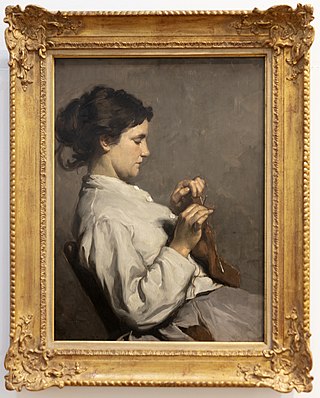
Edouard Agneessens was a Belgian painter born in Brussels. He studied under Jean-François Portaels from 1859 at the Académie Royale des Beaux-Arts in Brussels, and in 1869 won the Prix de Rome. In 1868, he was one of the founding members of the Société Libre des Beaux-Arts in Brussels.

Isabelle Laure Gatti de Gamond was a Belgian educationalist, feminist, and politician.

Marie Popelin was a Belgian lawyer and early feminist political campaigner. Popelin worked with Isabelle Gatti de Gamond in the development of women's education and, in 1888, became the first Belgian woman to receive a doctorate in law. After her accession to the bar was refused, Popelin went on to have an active career as the leader of the Belgian League for Women's Rights. She died in 1913 without ever gaining admission to the bar.
Stefania Wolicka (1851–1937) was a Polish historian and the first woman awarded a Doctorate of Philosophy at the University of Zurich.
Zoé Charlotte de Gamond was a Belgian educator and feminist who sometimes wrote under the pseudonym Marie de G***.
Marthe Boël was a Belgian feminist. She was the third daughter of the liberal senator Count Oswald de Kerchove de Denterghem and Maria Lippens, daughter of August Lippens.
Christiane Mercelis is a Belgian former tennis player active in the 1950s and 1960s.
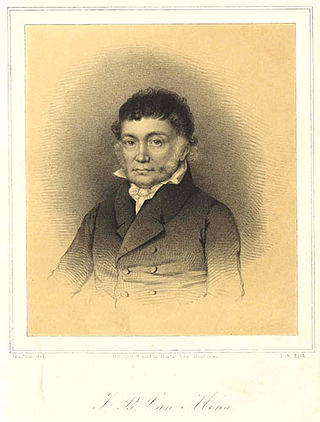
The State University of Leuven was a university founded in 1817 in Leuven in Belgium, then part of the United Kingdom of the Netherlands. It was distinct from the Old University of Leuven (1425-1797) and from the Catholic University of Leuven, which moved from Mechlin to Leuven after the State University had been closed in 1835.

Leuven railway station, officially Leuven, is the main railway station in Leuven, Flemish Brabant, Belgium. The station is operated by the National Railway Company of Belgium (NMBS/SNCB) and is located on railway line 36. In 2007, it was the fifth-busiest station in Belgium, only preceded by the three main Brussels stations and Gent-Sint-Pieters railway station.
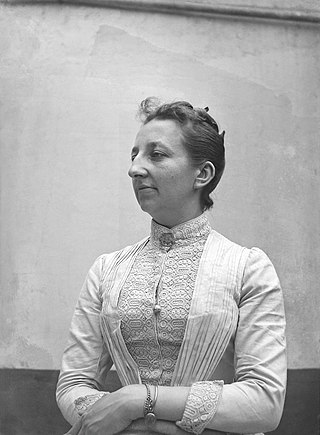
Léonie La Fontaine was a Belgian pioneering feminist and pacifist. Active in the international feminism struggle, she was a member of the Belgian League for the Rights of Women, the National Belgian Women Council and the Belgian’s Women's International League for Peace and Freedom. Her brother was Henri La Fontaine, Belgian international lawyer and president of the International Peace Bureau who received the Nobel Prize for Peace in 1913, and was also an early advocate for women's rights and suffrage, founding in 1890 the Belgian League for the Rights of Women.

Barbe-Henriette Dieudonnée Dachsbeck was a Belgian educator and feminist who was instrumental in the development of women's education in Belgium at the end of the nineteenth century.

The Isabelle Gatti de Gamond Royal Atheneum is a French-speaking K-12 school located in Brussels, Belgium. When founded in 1864 by Isabelle Gatti de Gamond, the school was the first non-confessional school for girls in Belgium.
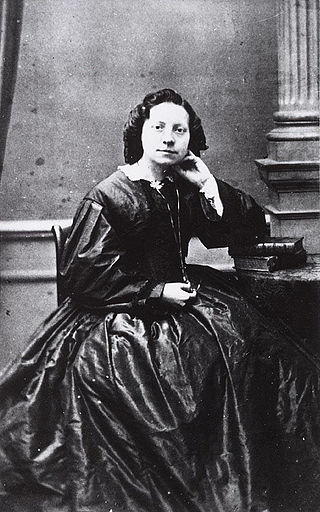
Christina Elizabeth (Betsy) Perk, was a Dutch author of novels and plays, and a pioneer of the Dutch women's movement, who wrote under the pen names Philemon, Liesbeth van Altena, and Spirito. She is known as the founding member of the Algemeene Nederlandsche Vrouwenvereeniging Arbeid Adelt in 1871, the women's magazine Onze Roeping, and the weekly magazine for women Ons Streven in 1869, the latter publication being the country's first women's periodical. In later years, her influence and activism diminished due to poor health, and she mainly focused on writing historical novels. From 1880 to 1890, she lived in Belgium. She is buried at the cemetery Rustoord in Nijmegen.
Louise van den Plas was a Belgian suffragist and the founder of the first Christian feminist movement in Belgium.

The Belgian League for the Rights of Women was a political association founded in Belgium in 1892. Established by Marie Popelin and her lawyer Louis Frank, it was created in response to the refusal to allow Popelin, a law graduate, to practice at the Bar. Based on the French Ligue française pour le droit des femmes, it immediately attracted 300 members. The organization was initially concerned with equal rights rather than women's suffrage but prioritized voting rights in 1912.
Events in the year 1842 in Belgium.
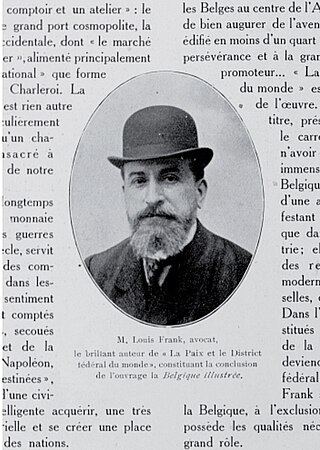
Louis Frank was a Belgian lawyer, philosopher and pioneer of the Belgian feminist movement.
Les Cahiers du GRIF was a French language feminist periodical that examined women's views through kinship, politics, love, sexuality, knowledge, work, and creation. Founded in 1973 in Brussels by Françoise Collin, the last issue was published in 1994.
Éliane Stas de Richelle, also known as Marie Denis was a Belgian writer and feminist.












